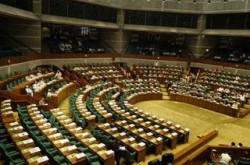Law Vision
Floor crossing and expanding horizon of MPs
Oli Md. Abdullah Chowdhury
 While parliamentary committe on constitutional amendment has started working on possible change in the constitution, the issue of anti-floor crossing necessarily came forward. Newspaper report (The Daily Star /April 1, 2011) cited discussion in the meeting of parliamentary special committee on constitutional amendment about possible amendments in the anti-floor crossing provision of the constitution. This provision has not only restricted role of MP as legislator, but limits significantly the scope of MPs to think beyond party dimension. Amendments of the relevant article might contribute in flourishing parliamentary democracy and create scope for MPs to think beyond party interest.
While parliamentary committe on constitutional amendment has started working on possible change in the constitution, the issue of anti-floor crossing necessarily came forward. Newspaper report (The Daily Star /April 1, 2011) cited discussion in the meeting of parliamentary special committee on constitutional amendment about possible amendments in the anti-floor crossing provision of the constitution. This provision has not only restricted role of MP as legislator, but limits significantly the scope of MPs to think beyond party dimension. Amendments of the relevant article might contribute in flourishing parliamentary democracy and create scope for MPs to think beyond party interest.
Crossing the floor
In general, crossing the floor is the term used to describe a Member of Parliament's decision to leave one political party to join another. However, there is slight change in usage of the term and it is most often used to describe members of the government party or parties who defect and vote with the opposition against some piece of government-sponsored legislation.
Article 70 of the constitution
“A person elected as a member of Parliament at an election at which he was nominated as a candidate by a political party shall vacate his seat if he resigns from that party or votes in Parliament against that party”- said in the Article 70(1) of the constitution.
It was in 1972 when the provision of “anti-floor crossing” was first introduced in the constitution. Later, further amendments were made in order to tighten the grip. Even if a member of the parliament does not attend the session or abstain from the voting, it is also considered a violation of the clause. In order to tighten the nod further, new amendments were made. Forming group within a parliamentary party is discouraged and joining another political party would result in the loss of membership in the parliament.
Suggested amendments
On the one hand, there is a proposal in front of the committee for the restoration of the original article 70 of the 1972 constitution. On the other hand, some members of the parliamentary special committee on constitutional amendment are in favour of allowing MPs with unfettered freedom to perform except on some specific issues. If it is possible, then there would be scope for MPs to play a wider role in the parliament.
Possible advantages
If we look at the example of Britain, former British Prime Minister Tony Blair who suffered his first voting defeat in the parliament when as many as 49 MPs from his own party voted against a bill to extend the tenure of the detention of suspected terrorists in November 9, 2005. As soon as the government attempted to introduce the bill in the parliament, civil liberty groups campaigned against the law and lobbied with the MPs. Despite having the overwhelming majority in the parliament, Blair did not manage the bill to pass through. MPs crossed the floor and voted against the proposed draconian law.
It would be very ambitious for us, if we expect a radical change in the role of legislators in Bangladesh with some amendments in the constitution. If there is a scope created, MPs might come forward in the future to cast their vote in the greater interest of the country. In order to get maximum benefit from the parliamentary form of democracy, the current restriction imposed upon lawmakers through article 70 of the constitution needs to be relaxed.
Conclusion
Many of the analysts have identified continuous boycott of the parliament by opposition as one of the prime weaknesses of our parliamentary democracy. Even if a member of the opposition wants to join in the parliament ignoring party decision, it involves risk of losing the seat. Let alone members of the opposition, lawmakers from the government party are bound to follow party whips or risk losing the seat in the parliament. MPs should be at least provided an opportunity to play a wider role in the parliament through necessary amendments in the constitution.
The writer is a human-rights worker.